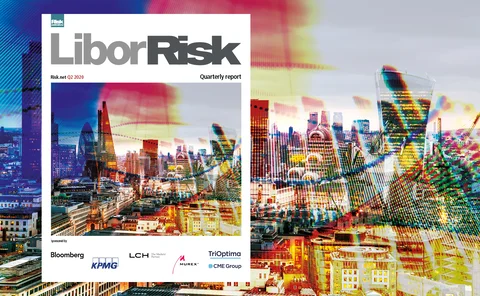KPMG
Credit spread risk approach differs among EU banks, survey finds
KPMG survey of more than 90 banks reveals disagreement on how to treat liabilities and loans
Credit Suisse shake-up, HSBC’s new CFO, and more
Latest job changes across the industry
As interest rates surge, bankers fret over last year’s models
IRRBB modellers trying to predict client behaviour have little relevant data to fall back on
Asia Risk Awards 2022: The winners
All the winners of this year's Asia Risk and Technology awards
Risk management consultant of the year: KPMG
Asia Risk Awards 2022
‘Nightmare’ of uncertainty plagues FRTB model applications
Shifting timetable and rule tweaks that could alter incentives dampen appetite for internal models
Why FRTB model test loves volatility, but hates hedges
Crucial P&L test for internal models easier to pass if price swings are large, or desks poorly hedged
People moves: JPM’s quant shuffle, NatWest hires Solanki, and more
Latest job changes across the industry
Does regulators’ favourite climate risk metric measure up?
FSB and Basel Committee back climate VAR, but practitioners will take some convincing
UK tipped to take lead on consolidated tape provision
Fixed income focus could pip European Union in race to provide market data golden source
Consulting firm of the year: KPMG
Asia Risk Awards 2020
EBA’s software compromise draws fire on two fronts
UK regulator suggests it will neuter the proposed capital relief, which banks say doesn’t go far enough
Letting go of Libor – How banks and buy-side firms are navigating the road to transition
Libor’s demise as a trusted benchmark presents a seismic challenge to the financial services industry. As time ticks down to its planned replacement in 2021 and alternative rates and new products emerge, market participants must determine the risks to…
Libor Risk – Quarterly report Q2 2020
Detaching an estimated $350 trillion of financial contracts from Libor was always going to be an uphill struggle. For a rump of so-called “tough legacy” contracts it’s a near impossible task. Now their future lies in the hands of legislators
Leaked doc: EU bans initial margin haircuts to resolve CCPs
Council will ban resolution authorities from dipping into clearing members’ initial margin
How Covid‑19 is impacting transition preparations
A forum of industry leaders, including the sponsors of this report, discusses key industry concerns around the transition away from Libor, including how the discontinuation deadline will be impacted by the Covid‑19 pandemic, the benefits and challenges…
SOFR and credit spread – Not as simple as it seems
Chris Dias, principal and global Libor solution co-lead at KPMG, explores how the market will adjust as liquidity grows and why firms must resist the temptation to default to existing processes for determining credit spread and rethink the traditional…
Libor Risk Q&A – KPMG
Chris Dias and Chris Long, principals and global Libor solution co-leads, discuss key industry concerns around the transition away from Libor, including how the discontinuation deadline will be impacted by the Covid‑19 pandemic, the benefits and…
Utilising technology to integrate capital management and stress-testing
This webinar explores how stress-testing has evolved over the past few years and how financial institutions can benefit from leveraging models in capital planning
Libor Risk – Quarterly report Q1 2020
Regulators may have to accept Libor transition will be slower than they hoped. But the final framework may yet be more robust as a result. Knowing how rates perform in times of stress will be crucial to the success of benchmarks intended for real economy…
Operational uncertainty – An unavoidable challenge
The transition from Libor to a new risk-free rate has revealed a number of challenges for all financial markets participants – the nature and scope of what lies ahead is vast, impacting businesses, operations and support functions. KPMG‘s global Libor…






















